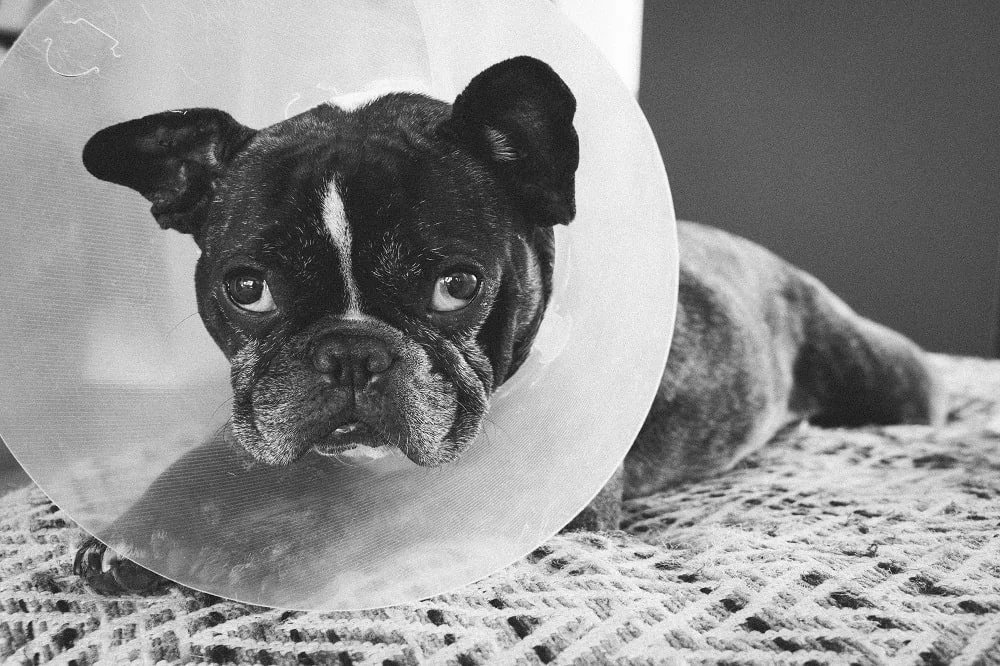What to Feed French Bulldogs With Allergies?

Welcoming a French Bulldog into your home brings joy, but it also comes with the responsibility of understanding and addressing potential health issues, such as allergies.
“Quick Guide: If your French Bulldog battles allergies, find nourishing and dog-friendly food options for their well-being. Dive into our guide for a happy and healthy furry friend!”
This article aims to guide you through the intricate landscape of French Bulldog allergies, focusing on what to feed them for optimal health.
Understanding Allergies in French Bulldogs

Let’s demystify allergies in French Bulldogs, ensuring a happy and healthy life for our furry friends. As someone passionate about dog well-being, I encourage fellow French Bulldog enthusiasts to explore the specifics of these adorable companions’ allergies.
It’s not just about being aware; it’s about actively embracing their unique needs. By understanding their allergies, we can create environments and choose diets that make them thrive.
Your French Bulldog’s health is a reflection of your care, and by delving into their allergies, you’re not just a pet owner you’re a devoted guardian dedicated to providing a lively and comfortable life for your lovable companion.
Exploring Hypoallergenic Characteristics
Diving into the realm of hypoallergenic characteristics specific to French Bulldogs sheds light on their unique needs. These may include dietary considerations, environmental factors, and genetic predispositions that contribute to their susceptibility to allergies.
In the context of French Bulldogs, hypoallergenic characteristics involve identifying elements that minimize the risk of triggering allergic responses. These may encompass specific protein sources, grains, and additives commonly found in commercial dog food.
Exploring these characteristics enables pet owners to make informed decisions when selecting suitable nourishment for their French Bulldogs.
Identifying Common Allergy Symptoms

Allergies in our furry companions can manifest in various ways, and recognizing the symptoms is key to ensuring their well-being. Let’s delve into the distinct signs that might indicate your pet is grappling with allergies.
- Chronic Bad Gas or Diarrhea: One subtle yet telling symptom of allergies in pets is the occurrence of chronic bad gas or diarrhea. This digestive distress could be a result of certain food sensitivities or environmental factors triggering an adverse reaction in your pet’s system.
- Coughing: If you’ve noticed your pet engaging in bouts of coughing, it could be more than just a passing irritation. Persistent coughing may signal an underlying respiratory allergy, and a closer examination is essential to pinpoint the cause.
- Face Rubbing: Unexplained face rubbing might be a manifestation of discomfort caused by allergies. Paying attention to this behavior can provide insights into potential allergens present in their surroundings or even in their diet.
- Itchy Skin & Butt: Itching is a common allergic response in pets, and if your furry friend is persistently scratching, especially around the skin and butt area, it may indicate allergic reactions. Examining their diet and immediate environment is crucial to identifying potential triggers.
- Licking Their Feet: Excessive licking of paws is another sign that your pet might be grappling with allergies. This behavior often indicates irritation or discomfort, prompting a thorough investigation into potential allergens causing distress.
- Runny Discharge from the Eyes or Nose: Allergic reactions can also manifest in respiratory symptoms, such as a runny discharge from the eyes or nose. Observing these signs can aid in understanding the nature of the allergy, whether it’s triggered by environmental factors or specific substances in their surroundings.
- Sneezing and/or Reverse Sneezing: Sudden bouts of sneezing or reverse sneezing may catch your attention, and these respiratory symptoms could be indicative of an allergic response. Identifying the triggers behind these episodes is crucial for effective allergy management.
- Stomach Problems: Allergies can impact the gastrointestinal tract, leading to stomach problems like indigestion or discomfort. Monitoring your pet for signs of stomach issues is essential for a comprehensive understanding of their allergic condition.
- Vomiting and Diarrhea: Persistent vomiting and diarrhea are more pronounced signs of digestive distress, often linked to allergic reactions. Identifying the specific triggers causing these symptoms is imperative for tailoring an effective care plan.
- Wheezing: Wheezing, characterized by a high-pitched sound during breathing, is a respiratory symptom that may point toward allergic respiratory distress. Understanding the nature of these allergies aids in providing targeted care to alleviate discomfort.
Causes of Allergies in French Bulldogs
French Bulldogs, with their endearing personalities, are not immune to the challenges posed by allergies. Understanding the causes behind these allergies is fundamental to providing optimal care for our four-legged companions.
Unveiling Common Triggers
Exploring the diverse triggers that can incite allergic responses in French Bulldogs sheds light on the intricacies of managing their health proactively.
Foods as Allergen Sources

Delving into the realm of dietary triggers, certain foods can emerge as common culprits for French Bulldog allergies. Let’s unravel the specifics of each potential allergen:
Beef
Beef, though a protein source in many dog foods, can be a noteworthy trigger for allergic reactions in French Bulldogs. Hypersensitivity to beef proteins may manifest in various allergic symptoms.
Dairy
Dairy products, often included in canine diets, can provoke allergic responses in some French Bulldogs. Lactose intolerance and allergic reactions to dairy proteins are aspects to consider when evaluating dietary causes.
Wheat
Wheat, a prevalent ingredient in dog food formulations, may contribute to allergies in French Bulldogs. Gluten sensitivity or allergic reactions to proteins found in wheat are factors to watch for.
Egg
While eggs are a valuable protein source, they can also be potential allergens for French Bulldogs. Egg allergies may manifest through various symptoms, emphasizing the need for dietary scrutiny.
Chicken
Surprisingly, chicken, a staple in many dog diets, can be a trigger for allergic responses in French Bulldogs. Allergic reactions to proteins present in chicken necessitate careful consideration.
Lamb/Mutton
Lamb or mutton, commonly used in some dog foods, may pose allergic risks for French Bulldogs. Monitoring for any adverse reactions to these proteins is crucial for tailored dietary choices.
Soy
Soy, a plant-based protein, can also be an allergen source for French Bulldogs. Hypersensitivity to soy proteins may manifest in various allergic symptoms, warranting attention.
Pork
Pork, while not as common in dog foods, can still be a potential allergen for French Bulldogs. Monitoring for allergic reactions to pork proteins is essential in crafting a hypoallergenic diet.
Fish
Fish, often included for its omega-3 fatty acids, can paradoxically be a trigger for allergies in French Bulldogs. Allergic responses to fish proteins underscore the importance of dietary variety assessment.
Indoor Allergens

Beyond dietary considerations, indoor allergens can significantly impact French Bulldogs. Unveiling these triggers enhances our ability to create allergen-free environments.
Dust and Dust Mites
Dust, a seemingly innocuous household component, can harbor dust mites that trigger allergies in French Bulldogs. Regular cleaning and maintaining a dust-free environment are key preventive measures.
Mold Spores
Mold spores, commonly found in damp areas, can induce allergic reactions in French Bulldogs. Identifying and addressing mold sources is vital for minimizing indoor allergens.
Pollen
Pollen, typically associated with outdoor allergies, can also find its way indoors, affecting French Bulldogs. Monitoring pollen levels and minimizing outdoor exposure during peak seasons are essential precautions.
Cockroaches
Cockroach droppings and body parts contain proteins that can trigger allergies in French Bulldogs. Implementing effective pest control measures helps mitigate this indoor allergen source.
Pet Dander
Surprisingly, pet dander, despite being part of a pet’s natural shedding process, can act as an allergen for French Bulldogs. Regular grooming and cleaning routines contribute to minimizing pet dander.
Some Plants
Certain indoor plants may release allergens that affect French Bulldogs. Awareness of plant choices and their potential allergenic impact aids in creating a pet-friendly environment.
Outdoor Allergens

French Bulldogs exploring the great outdoors may encounter specific allergens. Understanding these outdoor triggers allows for informed preventive measures.
Pollen
Similar to indoor settings, pollen from various plants and flowers can trigger allergies in French Bulldogs outdoors. Monitoring pollen levels and selecting suitable outdoor environments are prudent strategies.
Mold Spores
Outdoor environments, particularly in humid conditions, can harbor mold spores that affect French Bulldogs. Regular grooming and minimizing exposure to damp areas help mitigate this risk.
Trees
Certain tree pollens can act as allergens for French Bulldogs. Recognizing peak pollen seasons for specific trees aids in planning outdoor activities for your furry friend.
Grasses and Weeds
Grasses and weeds, prevalent in outdoor spaces, may contribute to allergic reactions in French Bulldogs. Choosing areas with minimal exposure to potential triggers supports their outdoor well-being.
Varieties of French Bulldog Allergies

French Bulldogs, those delightful companions with their distinctive personalities, can face an array of allergies. Understanding the varieties of allergies is crucial for providing attentive care to these cherished pets.
Culinary Sensitivities and Intolerance
Delving into the realm of culinary sensitivities and intolerance reveals a spectrum of challenges that French Bulldogs may encounter in their diet.
Common Culprits of Food Intolerance
Food intolerance, a subtle adversary, can manifest as digestive discomfort rather than an overt allergic response. Recognizing common culprits is key to maintaining the well-being of our French Bulldogs.
Problematic Foods for French Bulldogs
Certain foods, innocuous to many, can pose challenges for French Bulldogs, either triggering allergies or contributing to intolerances. Let’s explore the intricacies of these problematic foods that demand careful consideration.
- Eggs
- Beef
- Chicken
- Wheat
- Soy
- Wheat
- Milk
- Cheese
Environmental and Seasonal Allergies

Moving beyond the culinary realm, French Bulldogs may encounter environmental and seasonal allergies, necessitating keen observation and proactive care.
Identifying Symptoms
Recognizing symptoms is paramount in addressing environmental and seasonal allergies in French Bulldogs.
- Scratching and Biting
- Inflamed and Infected Skin
- Excessive Shedding
- Paw Licking
- Scooting Their Butt
- Chronic Ear Infections
Major Contributors to Environmental Allergies
Understanding the substances that contribute to environmental allergies aids in creating allergen-free living spaces for French Bulldogs.
Troublesome Substances for French Bulldogs:
- Dust and Dust Mites
- Pollen
- Mold Spores
- Animal Dander
- Grass
- Flea Bites
Dermatological Allergies

Dermatological allergies encompass a variety of skin-related challenges that French Bulldogs may face, demanding specific attention and care.
Varieties of French Bulldog Skin Allergies
-
Allergic Dermatitis: Inflammation of the skin triggered by allergens, often resulting in itching and discomfort.
-
Yeast Infections: Overgrowth of yeast on the skin, leading to irritation and infections.
-
Impetigo: Bacterial skin infection characterized by pustules, common in young French Bulldogs.
-
Seborrhea: Skin condition causing excessive oiliness or dryness, contributing to skin discomfort.
-
Ringworm: Fungal infection causing circular, red, and itchy patches on the skin.
-
Mange: Skin infestation by mites, resulting in intense itching and discomfort.
-
Dry/Flaky Skin: Dehydration or lack of moisture in the skin leading to dryness and flakiness.
-
Hot Spots: Localized areas of inflamed and infected skin, often exacerbated by allergies.
French Bulldog Allergy Treatments
When it comes to addressing allergies in our beloved French Bulldogs, a thoughtful approach to treatment is paramount. Let’s explore three effective strategies to manage and alleviate allergic reactions, ensuring the well-being of our furry companions.

1. Eliminate the Allergen
The first and foremost step in managing French Bulldog allergies is to identify and eliminate the allergen responsible for triggering adverse reactions. This proactive approach involves a meticulous investigation into the dog’s environment, diet, and daily exposures. By pinpointing and removing the allergen, we create a foundation for long-term allergy management.
2. Incorporate Probiotic Allergy Support Supplements
Probiotics often hailed for their beneficial impact on gut health, can play a significant role in managing French Bulldog allergies. These supplements, rich in beneficial bacteria, work to balance the digestive system and strengthen the immune response.
The enhanced immune function can help mitigate allergic reactions and contribute to the overall well-being of our furry friends. Consider consulting with a veterinarian to determine the most suitable probiotic supplement for your French Bulldog’s specific needs.
3. Consider Benadryl for Frenchie Allergies
In certain situations, when allergic reactions are acute or persistent, considering medication can be a prudent choice. Benadryl, an antihistamine commonly used in humans, can also be administered to French Bulldogs under veterinary guidance.
It works by blocking histamine, a compound involved in allergic responses, thereby alleviating symptoms such as itching, inflammation, and sneezing. However, the dosage and frequency must be determined by a veterinarian based on the individual characteristics and health status of the French Bulldog.
Frequently Asked Questions
-
What is the most common food allergy in French Bulldogs?
- Common food allergies in French Bulldogs often include poultry, beef, dairy, and grains. Identifying the specific allergen can help tailor their diet.
-
How do you know if your Frenchie is allergic to food?
- Signs of food allergies may manifest as skin issues, digestive problems, or behavioral changes. Consult your vet if you observe any unusual symptoms.
-
What food is best for a French Bulldog with allergies?
- Hypoallergenic diets with limited ingredients or novel proteins like duck or venison can be beneficial. Consulting with a vet helps determine the most suitable option for your Frenchie.
Summing It Up
Effectively managing allergies in French Bulldogs requires a tailored and holistic approach. By eliminating the identified allergen, incorporating probiotic supplements, and judiciously considering medications like Benadryl under professional guidance, we can provide comprehensive care for our furry companions.
Always consult with a veterinarian to create a personalized allergy management plan that ensures the health and happiness of your beloved French Bulldog.
FURTHER READING
For information, we have a range of articles discussing the best food and nutrition options, for your French Bulldog as well as tips, on maintaining their health and providing proper care.




